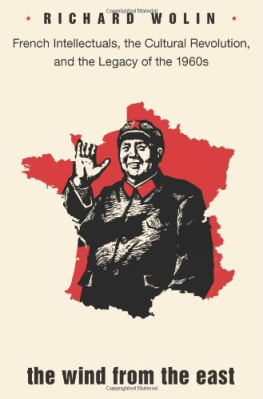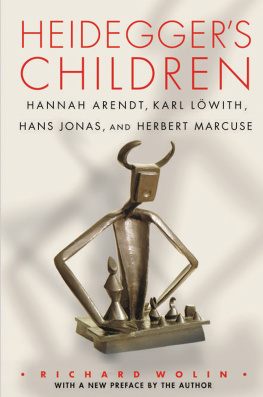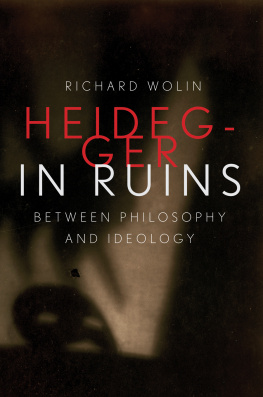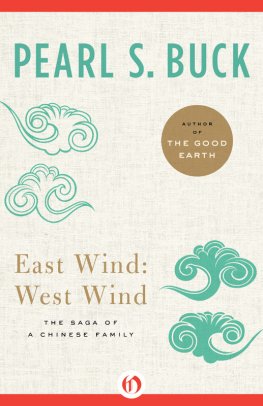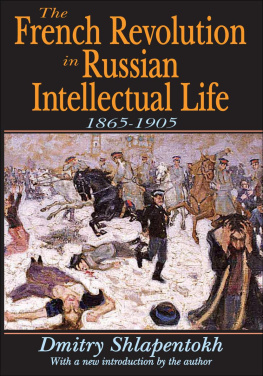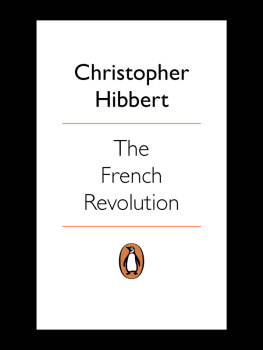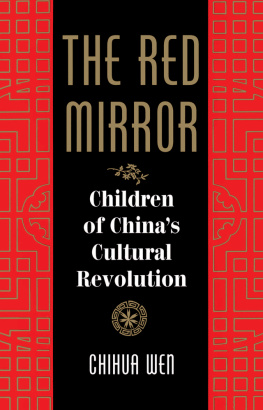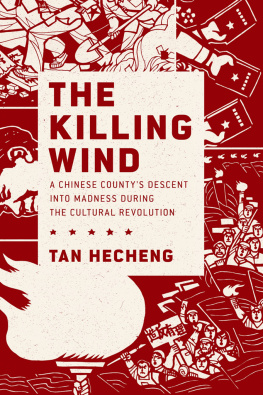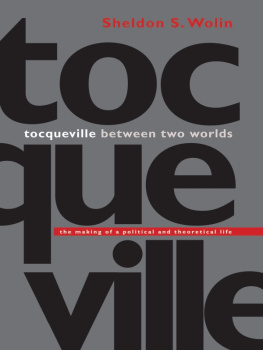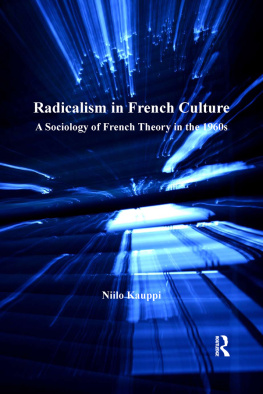Richard Wolin - The Wind from the East: French Intellectuals, the Cultural Revolution, and the Legacy of the 1960s
Here you can read online Richard Wolin - The Wind from the East: French Intellectuals, the Cultural Revolution, and the Legacy of the 1960s full text of the book (entire story) in english for free. Download pdf and epub, get meaning, cover and reviews about this ebook. year: 2010, publisher: Princeton University Press, genre: Politics. Description of the work, (preface) as well as reviews are available. Best literature library LitArk.com created for fans of good reading and offers a wide selection of genres:
Romance novel
Science fiction
Adventure
Detective
Science
History
Home and family
Prose
Art
Politics
Computer
Non-fiction
Religion
Business
Children
Humor
Choose a favorite category and find really read worthwhile books. Enjoy immersion in the world of imagination, feel the emotions of the characters or learn something new for yourself, make an fascinating discovery.
- Book:The Wind from the East: French Intellectuals, the Cultural Revolution, and the Legacy of the 1960s
- Author:
- Publisher:Princeton University Press
- Genre:
- Year:2010
- Rating:5 / 5
- Favourites:Add to favourites
- Your mark:
- 100
- 1
- 2
- 3
- 4
- 5
The Wind from the East: French Intellectuals, the Cultural Revolution, and the Legacy of the 1960s: summary, description and annotation
We offer to read an annotation, description, summary or preface (depends on what the author of the book "The Wind from the East: French Intellectuals, the Cultural Revolution, and the Legacy of the 1960s" wrote himself). If you haven't found the necessary information about the book — write in the comments, we will try to find it.
The Wind from the East: French Intellectuals, the Cultural Revolution, and the Legacy of the 1960s — read online for free the complete book (whole text) full work
Below is the text of the book, divided by pages. System saving the place of the last page read, allows you to conveniently read the book "The Wind from the East: French Intellectuals, the Cultural Revolution, and the Legacy of the 1960s" online for free, without having to search again every time where you left off. Put a bookmark, and you can go to the page where you finished reading at any time.
Font size:
Interval:
Bookmark:

The Wind from the East
O THER B OOKS BY R ICHARD W OLIN
Walter Benjamin: An Aesthetic of RedemptionThe Politics of Being: The Political Thought of Martin HeideggerThe Heidegger Controversy: A Critical ReaderThe Terms of Cultural Criticism: The Frankfurt School, Existentialism, PoststructuralismLabyrinths: Critical Explorations in the History of IdeasKarl Lwith, Martin Heidegger and European Nihilism (editor)Heideggers Children: Karl Lwith, Hannah Arendt, Hans Jonas, and Herbert MarcuseThe Seduction of Unreason: The Intellectual Romance with Fascism from Nietzsche to PostmodernismHerbert Marcuse, Heideggerian Marxism (coeditor)The Frankfurt School Revisited and Other Essays on Politics and Society The Wind from the East French Intellectuals, the Cultural Revolution,and the Legacy of the 1960s Richard Wolin P RINCETON U NIVERSITY P RESS Princeton & OxfordCopyright 2010 by Princeton University Press Requests for permission to reproduce material from this work should be sent to Permissions, Princeton University Press Published by Princeton University Press, 41 William Street, Princeton, New Jersey 08540 In the United Kingdom: Princeton University Press, 6 Oxford Street, Woodstock, Oxfordshire OX20 1TW All Rights Reserved L IBRARY OF C ONGRESS C ATALOGING-IN -P UBLICATION D ATA Wolin, Richard.
The wind from the east : French intellectuals, the cultural revolution, and the legacy of the 1960s / Richard Wolin.
p. cm.
Includes bibliographical references and index.
ISBN 978-0-691-12998-3 (hardcover : acid-free paper)
1. IntellectualsFranceHistory20th century. 2. IntellectualsFrancePolitical activityHistory20th century. 3. FranceIntellectual life20th century. 4. CommunismFranceHistory20th century. 5. ChinaHistoryCultural Revolution, 19661976Influence. 6. Mao, Zedong, 18931976Influence. I. Title.
DC33.7.W75 2010
305.5'52094409046dc22 2009041630
British Library Cataloging-in-Publication Data is available This book has been composed in Bembo and Helvetica Neue Printed on acid-free paper. press.princeton.edu Printed in the United States of America 10 9 8 7 6 5 4 3 2 1 F OR MY S TUDENTS AT THE U NIVERSITY OF P ARISAND THE U NIVERSITY OF N ANTES, 20052008 There are now two winds blowing in the world: the
Wind from the East and the Wind from the West.
According to a Chinese saying: either the Wind from
the East will triumph over the Wind from the West,
or the Wind from the West will triumph over the
Wind from the East. In my opinion, the nature of the
present situation is that the Wind from the East has
triumphed over the Wind from the West.
Mao Tse-tung

The Wind From the East must be regarded as a monument of committed scholarship. It is also a fascinating chronicle of people who, however ludicrous they may seem at times, did on occasion think and act with profound seriousness. For that reason the book is a valuable addition to the literature of the era. -- David Gress, Wall Street JournalEven as he is documenting the delusions of the sixty-eighters--often with considerable wit, and with a seemingly encyclopedic familiarity--Wolin grants credence to their skewed perception of the status quo in France and in the West more generally. Disagreements and exasperations aside, I found this book compulsively readable. The history of Sixties is a long way from being exhausted. -- John Wilson, Books & CultureWolin argues that fascination with the Great Proletarian Cultural Revolution reflected, not simply a taste for exoticism, but a delayed response to postwar capitalist modernisation. -- Scott McLemee, The National
If you can remember anything about the sixties,
you werent really there.
Paul Kantner, Jefferson Starship
According to an oft-cited maxim, all history is the history of the present. Try as they might, historians are incapable of abstracting from contemporary issues and concerns. In fact, were they to do so, their work would surely reek of antiquarian sterility. At best, historians can make their biases clear to ensure they do not exercise an overtly disfiguring influence on their presentations and findings.
The presence of the past is especially true of the 1960s. Analysts and commentators have heatedly debated their meaning and import, but nearly all agree that the decade was a watershed. Whatever their ultimate meaning, the 1960s were a caesura that signified the impossibility of returning to the status quo ante. Thus, today the 1960s remain an inescapable rite of passage for those who seek to fathom the nature of the political present. First, their range and extent was genuinely international. In an age of instantaneous, mass communication, virtually no corner of the globe could remain immune from their influence and legacy. Second, the decades effects, rather than being confined to one specific manifestation or mode, were, to invoke French anthropologist Marcel Mauss, a total social phenomenon. The 1960s and their aftereffects influencedand left permanently transformedthe realms of politics, society, fashion, art, and music.
By the same token, it would be impossible to deny that the 1960s have also become historical. Thus the decade has provided fertile ground for interpreters who are seeking to distill and comprehend the origins and bases of contemporary politics and society. Yet, as history, the 1960swhose study threatens to metastasize into another academic growth industrypossess a temporality with a peculiar and profound bearing on the historical present. As such, as a cultural and political phenomenon, the decade remains a pivotal way station on the road toward comprehending who we are and what we would like to become. Hence, to contribute to the historicization of the 1960s is at the same time a method of coming to grips with the history of the present.
According to one celebrated maxim, the 1960s are an interpretation in search of an event. Indeed, a dizzying vortex of interpretations has emerged seeking to fathom and clarify what transpired and why. Having both studied these events and lived through them as a youth (although, admittedly, many memories remain enshrouded in a Hendrix-esque purple haze), at this point, when asked about their ultimate meaning, I am often tempted to fall back on Chinese premier Zhou En-lais immortal response when asked to comment on the historical import of the French Revolution: Its too soon to tell.
Yet, if pressed to define the rational kernel of the 1960s, I would say that it was quite simply the era that rediscovered the virtues of participatory politics. The 1950s had witnessed the triumph of political technocracy. At the time, it had become an intellectual commonplace that government by elitesin most cases, white, male eliteswas preferable to the perils and risks of popular participation. Political mobilization from below was viewed as irrational and untrustworthy, a prelude to totalitarianism in either its right or left variant. The 1950s were a decade when the so-called welfare-warfare state was ascendant, culminating in the debacle of Vietnam and kindred foreign policy disasters that often resulted in massive and abhorrent human rights violations. (Sadly, in many cases, the promissory note on such violations remains past due.) In the United States and elsewhere, the 1960s signified an attempt to wrest control of the political from elites: to counter the ills of technocratic liberalism via recourse to logics of grassroots political engagement and thereby to restore confidence in basic democratic norms.
Font size:
Interval:
Bookmark:
Similar books «The Wind from the East: French Intellectuals, the Cultural Revolution, and the Legacy of the 1960s»
Look at similar books to The Wind from the East: French Intellectuals, the Cultural Revolution, and the Legacy of the 1960s. We have selected literature similar in name and meaning in the hope of providing readers with more options to find new, interesting, not yet read works.
Discussion, reviews of the book The Wind from the East: French Intellectuals, the Cultural Revolution, and the Legacy of the 1960s and just readers' own opinions. Leave your comments, write what you think about the work, its meaning or the main characters. Specify what exactly you liked and what you didn't like, and why you think so.

